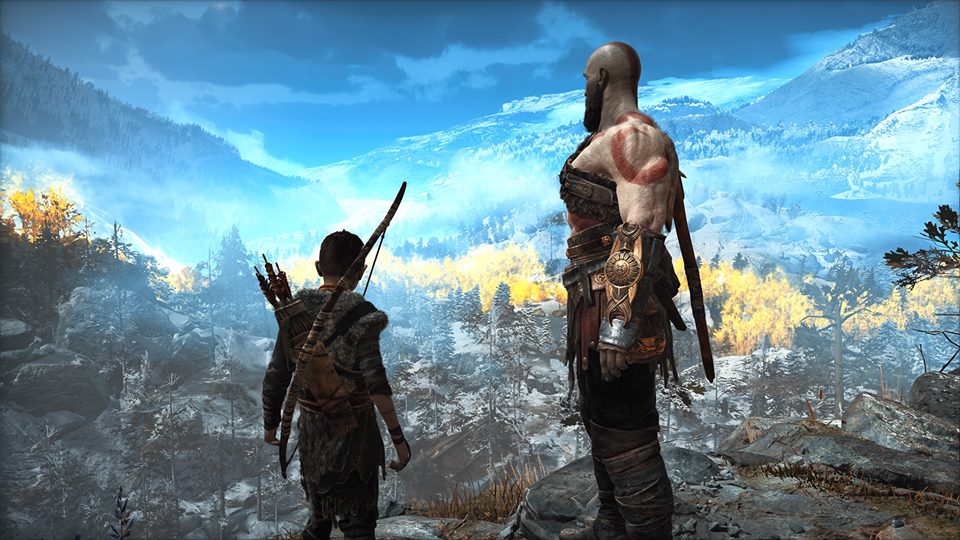
God of War
Norse mythology is apocalyptic. Its most infamous event is Ragnarok: the end of the world in which almost all of its gods are doomed to die. It’s this inescapable fate that makes them seem human and vulnerable. It’s also the perfect setting for this new kind of God of War game.
Kratos is no longer a seemingly invulnerable, god-killing machine. He is older, wiser and weary. The death of his wife brings not revenge, but a seemingly peaceful quest to fulfil her dying wish. And he has a son, Atreus – perhaps his ultimate weakness.
It’s this grounding in reality that marks a departure for the series. More than anything it’s a game that explores fatherhood: learning to accept our children for who they are, torn between allowing them freedom to be themselves and protecting them from making the same mistakes we did. The relationship between Kratos and Atreus is at the heart of God of Warand it’s authentically played. Watching their character growth is one of the game’s greatest pleasures.

The vastness of Norse mythology comes across in the game’s multi-world setting, filled with memorable characters both large and small, as well as story details collected in the game’s codex. Yet much of the mythology has been lost over time. That certainly allows for some creativity from writer Cory Barlog and the SIE Santa Monica team, who play fast and loose with the key characters and plotlines.
The core quest, though, ultimately dissatisfies. It lacks impetus and reason, instead meandering in convoluted fashion between worlds, with blocked paths and twists owing to video game mechanics more than plot. Too much exposition is left to optional conversations and a lack of some of Norse mythologies biggest names and stories leaves the game feeling open-ended and unresolved. Its final twist doesn’t feel earned and so falls flat. Clearly this is the first game in a new trilogy, but as a standalone story it’s incomplete.

Perhaps that dissatisfaction comes from a desire to learn more about this open world. It is one of the most technically accomplished and artistically inventive games to date (especially on PS4 Pro): vibrant, richly detailed and with beautifully intense lighting. But more so, it’s full of intrigue and history, its map frustratingly compact and certain key areas literally blocked off. It’s testament to the game’s meticulous craft that we’re left thirsting for more.
What does satisfy is the combat. The new camera perspective brings us closer to Kratos, figuratively and literally. Every swing of his Leviathan axe feels weighty and deliberate, each blow full of impact. Recalling the axe Thor-style never gets old. Levelling up skills, weapons and armour is initially obtuse due to confusing menus, but it does eventually allow for varying play styles. That goes for Atreus too, who evolves into another weapon in the player’s hands. What begins as lumbering and slow soon develops into an elegant yet methodical dance, blocking and dodging attacks while retaliating in extravagant fashion.

Enemy design forces the player to mix up their strategy and boss battles are challenging as well as visually bombastic. The change of perspective, though, does affect the sense of scale: as expected there are colossal set-pieces strewn amongst the smaller battles, but the grounded camera is too close to really take it all in. And too often you’re left to watch events rather than play through them.
Exploration is where God of War feels most like a video game. Taking its cue from Metroid and Dark Souls, the labyrinthine world twists and turns on itself, shortcuts allowing for quicker progression and secret areas requiring new abilities to enter. There’s a disconnect, though, between Kratos as a god and the restrictive nature of the design. Here’s a character who in cut scenes can leap great heights with ease while slaying titanic beasts, but in gameplay can still only climb certain walls and walk certain paths at a shuffling pace. It’s a reminder that this is a video game and not a god simulator.

Again, frustration at that restrictiveness comes from a desire to further explore, to delve into the world’s history and characters, to see what the designers can think up next. As a character study God of War excels, delivering a beautiful fantastical romp. And while its narrative is anti-climactic, it’s clear that the best is yet to come.
This article first appeared on The Gizzle Review





